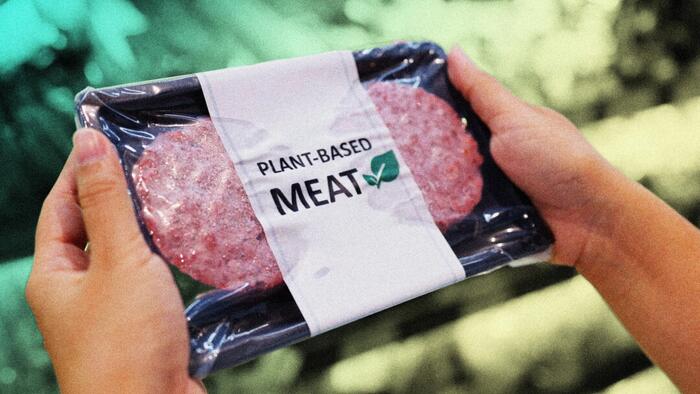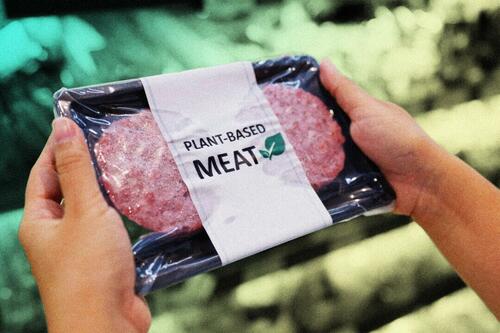


Authored by Mary West via The Epoch Times,
We often hear that ultra-processed foods can make us unwell, but what about fake meat? Plant-based meat alternatives (PBMA) are considered ultra-processed, which raises questions about how healthy they really are.
The findings of a new study published in Food Frontiers give PBMAs a closer look, raising concerns that experts have already been discussing. Fortunately, wherever you fall on the PMBA issue, there are plenty of plant-based meals you can make at home that do not pose the health risks that can come with ultra-processed food.
The study results indicated that PBMAs do not have clear risks but raise concerns that merit further research. PBMAs were associated with increased depression, inflammation, and higher blood pressure, as well as lower levels of a substance tied to lower levels of high-density lipoprotein, or “good” cholesterol.
Despite these negative effects, PBMAs were shown to have several positive effects, including a decreased risk of irritable bowel syndrome, obesity, and metabolic diseases, such as diabetes.
Ultra-processed food is known to have higher amounts of sodium, added sugar, and saturated fat than non- or low-processed food. Notably, researchers in the current study controlled for socioeconomic factors and differences in the amount of ultra-processed foods consumed.
Possible factors that may underlie the negative health effects involve higher content of processed ingredients, additives, and preservatives, all of which PBMAs often contain and may contribute to inflammation, noted the researchers.
A review published in Nutrients noted that the high contents of sodium, added sugar, saturated fat, and trans fat in ultra-processed foods promote chronic inflammation. Other factors associated with these foods that may lead to inflammation include additives, such as artificial sweeteners and emulsifiers, as well as chemicals in the packaging, such as phthalates and bisphenol.
Helen Taylor, a holistic wellness coach with a master’s degree in biomedical science and genetic and regenerative medicine specializing in molecular and cellular immunology genetics, provided additional insight on the subject. In an email to The Epoch Times, she explained that many PBMAs are made of synthetic ingredients, such as protein isolates, as well as vegetable oils, and additives to mimic the taste of meat.
“While they may appear like a good option on the surface, our bodies struggle to recognize and properly utilize these artificial substances,” Taylor said.
“I’ve seen how these products can disrupt the natural communication between the gut and brain, leading to inflammation and, as the Food Frontiers study suggests, even contributing to depression. It’s as though the body is asking, ‘What is this?’—because it’s certainly not real food.”
No consensus exists among health professionals on the health risks of PBMAs. Some experts advise complete avoidance, while others believe they are fine when consumed in moderation.
“I firmly believe people should avoid these products, even if they are plant-based,” said Taylor. “They lack the nutrient density and bioavailability of real, whole foods, and, in my experience, often do more harm than good.”
She recommended including grass-fed meat in the diet as a “far healthier choice.” Grass-fed meat is rich in high-quality protein, omega-3 fatty acids, and vital nutrients like B12, all of which support brain health and help reduce inflammation, she said.
“If someone is committed to avoiding meat altogether, I’d recommend sticking with whole-food vegetarian options, like eggs or dairy, rather than relying on ultra-processed PBMAs," Taylor concludes. “Your body deserves real nourishment—not a science experiment.”
Moderate intake of PMBAs is not harmful, according to Catherine Gervacio, a registered nutritionist and dietitian consultant for Superfood Green Fusion. In an email to The Epoch Times, she said that whether to include them in the diet depends on individual health goals, preferences, and how these products fit into an overall diet.
PBMAs are good options for enjoying familiar textures and flavors without eating meat, but they have the drawback of being highly processed, continued Gervacio. She said that if people enjoy PBMAs occasionally and the products help them stick to a vegetarian or vegan lifestyle, they are okay in moderation. Yet she advocated balancing them with whole, minimally processed plant foods like beans, lentils, vegetables, and nuts.
While Gervacio added that focusing on whole foods reaps better health, “it’s about balance and what works for your body, lifestyle, and values. Listen to your body, try new things, and find the mix that keeps you feeling your best.”
People lead busy lives, so reaching for PBMA is tempting because it provides quick, easy meals. Shoba Balaji, a registered dietitian nutritionist, urged people to transition from PBMAs to home-cooked, plant-based meals as a better option.
“Even though transition is hard initially, with time, it gets easier as you find recipes you like and your taste buds adapt to the change,” he said in an interview with The Epoch Times.
Balaji provides tips and meal ideas for preparing plant-based meals at home.
Breakfast ideas include:
Lunch ideas include:
Dinner ideas include:

